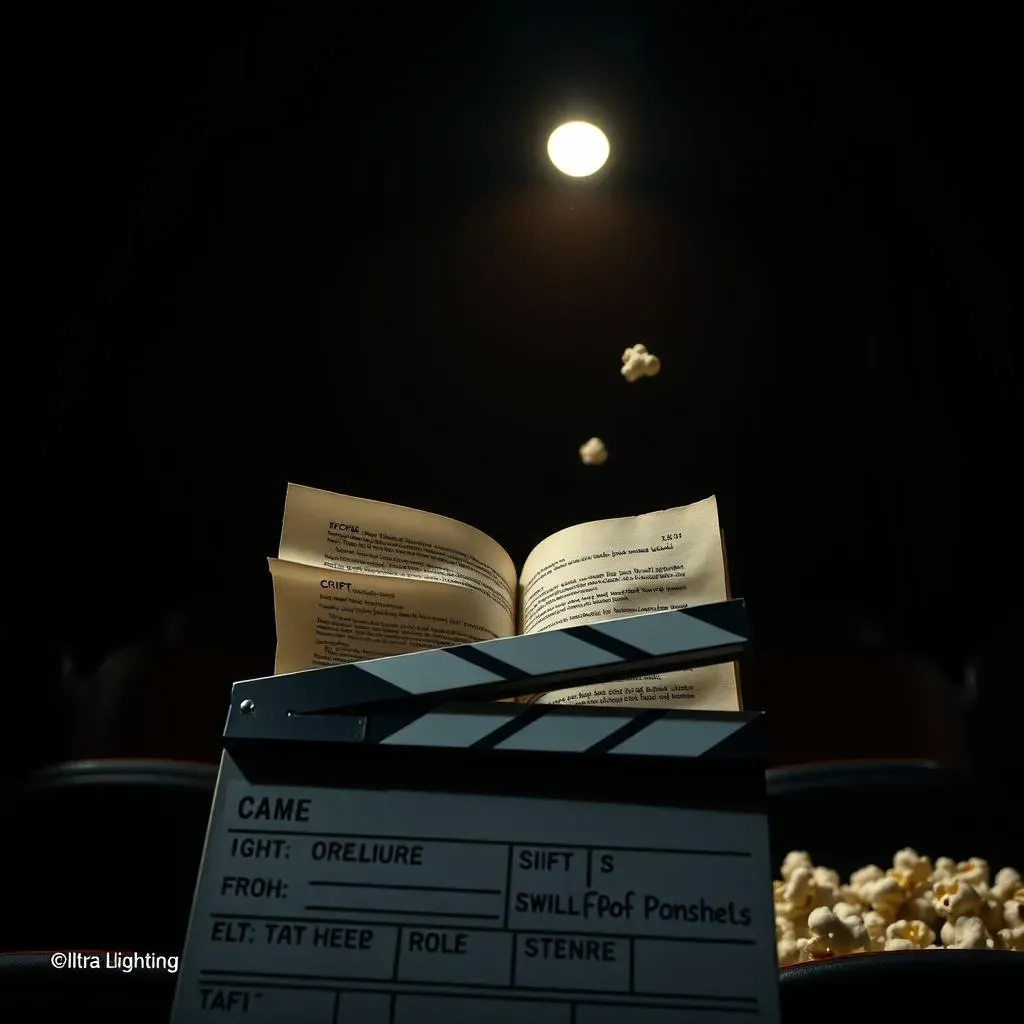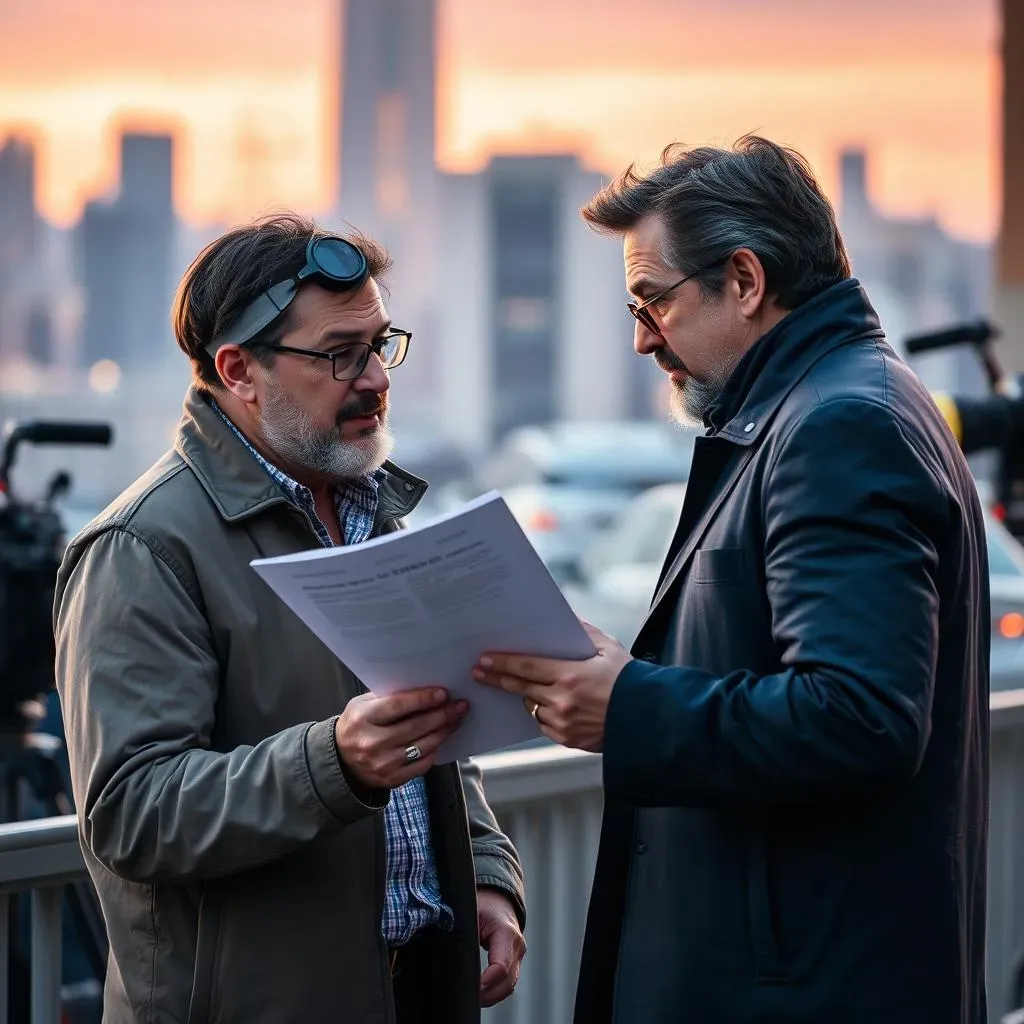Table of Contents
Ever wondered how those dazzling stars on the silver screen choose their roles? It's not as simple as just saying "yes" to the next big offer. Picking a role is a complex process, a delicate dance between creative fulfillment and shrewd career strategy. This article explores the fascinating world of "how do celebrities pick roles," revealing the hidden factors that influence their decisions. We'll journey behind the scenes, uncovering the crucial roles of agents and managers, the meticulous script selection process, the importance of directors and co-stars, and the often-overlooked business considerations. Prepare to gain insights into the minds of Hollywood's elite, and discover how their choices shape their careers and leave a lasting impact on the entertainment world. Get ready to uncover the secrets behind those captivating performances, and understand the multifaceted process that leads to a star's next iconic role.
The Role of Agents and Managers

The Role of Agents and Managers
Gatekeepers of Opportunity
So, you're diving into the world of how celebrities choose roles? Fantastic! Let's start with the unsung heroes – the agents and managers. These folks are more than just phone-callers; they're the gatekeepers, the strategists, the negotiators. Think of them as the celebrity's personal PR team, plus financial advisors, and career coaches all rolled into one. They don't just find roles; they curate opportunities that align with their client's goals and brand. A great agent knows the landscape intimately – they have connections with casting directors, producers, and studios. They anticipate trends and understand what type of roles will resonate with audiences and propel their client's career forward. They might even suggest a script to an actor if they think it's a perfect fit. It's a symbiotic relationship; the agent's success is tied to their client's success. Want to know more about how celebrities maintain their privacy? Check out this article: how celebrities maintain privacy.
For example, imagine a rising star known for action roles. Their agent won't just send them any script; they'll focus on scripts that showcase their strengths, build on their existing fan base, and potentially expand their range. They'll also consider the production company, the director's vision, and the overall potential for critical acclaim or box office success. It's a careful balancing act, constantly weighing artistic merit against commercial viability. This is where the real artistry of representation comes in.
Agent Responsibility | Manager Responsibility |
|---|---|
Securing auditions and roles | Long-term career planning |
Negotiating contracts | Brand management and endorsements |
Public relations | Financial management |
Beyond the Deal: Shaping a Career
But the role of agents and managers goes far beyond simply landing a role. They're actively involved in shaping the long-term trajectory of a celebrity's career. They're the ones who advise on taking on challenging roles to stretch their acting abilities, or perhaps advise against a role that might damage their public image – even if it's a big-budget blockbuster. They're constantly looking ahead, anticipating future opportunities and ensuring that their client is making choices that will keep them relevant and in demand for years to come. A good agent acts as a filter, protecting their client from unsuitable projects and helping them select roles that align with their personal and professional goals. Want to know more about how celebrities handle scandals? Read this article: how celebrities handle scandals.
Think of it as a chess game, with each role strategically chosen to advance their client's position in the industry. They're building a reputation, crafting a brand, and guiding their client’s career with a long-term vision in mind. It’s not just about the money (although that’s certainly a significant factor!), it’s about building a sustainable and fulfilling career. It's a collaborative effort, with open communication between the agent, manager, and the celebrity themselves. Their input and preferences are crucial in the decision-making process.
- Identifying suitable roles
- Negotiating contracts
- Managing public image
- Long-term career planning
Script Selection: What Makes a Role Appealing?

Script Selection: What Makes a Role Appealing?
The Power of the Story
Once agents and managers have done their work, the real fun begins: script selection! For celebrities, it's not just about the size of the paycheck (although that's definitely a factor, especially for those who earn a lot). It's about the story itself. A truly compelling script is the foundation of any great performance. Is the storyline gripping? Does it resonate with the actor on a personal level? Does the character arc offer opportunities for growth and exploration? These are the questions that will keep them up at night. They'll look for well-written dialogue, a rich character history, and a plot that keeps them on the edge of their seats.
Think of Meryl Streep. She's famous for choosing roles that challenge her, roles that allow her to delve into complex characters with flaws and complexities. She doesn't shy away from difficult subject matter; in fact, she seems to actively seek it out. She's not just picking roles; she's curating a body of work that's both impactful and enduring. It's not always about playing the "heroine"; sometimes, the villain, the supporting character, or even the seemingly insignificant bystander can provide the most rewarding and fulfilling experience.
- Compelling storyline
- Resonance with the actor
- Character arc for growth
- Well-written dialogue
Character Depth and Complexity
Beyond the overall narrative, the character themselves play a huge role. Celebrities aren’t just looking for a pretty face; they’re looking for roles with depth, nuance, and complexity. A well-developed character is like a delicious meal – it needs layers of flavor, intriguing backstories, and internal conflicts that make them relatable and human. A simple, one-dimensional character is just a blank canvas; a complex character is a masterpiece waiting to be painted. The opportunity to explore the motivations, fears, and contradictions of a character can be incredibly rewarding for an actor.
Consider Leonardo DiCaprio. He's known for taking on challenging roles that push him to his limits. He's not afraid to portray morally ambiguous characters or explore difficult themes. From his intense portrayal of Jack Dawson in *Titanic* to his chilling performance as Jordan Belfort in *The Wolf of Wall Street*, he consistently chooses roles that allow him to demonstrate his range and skill. His choices reflect not only his own artistic ambition but also his desire to tackle significant themes and create impactful work. Want to know more about what drives celebrities to pick certain causes? Check out this article: how celebrities connect with fans.
Character Trait | Impact on Role Choice |
|---|---|
Complexity | Offers depth and challenge |
Relatability | Connects with audience |
Internal Conflict | Provides dramatic tension |
Creative Vision and Collaboration
Finally, the creative vision of the director and the potential for collaboration are major factors. Celebrities often choose roles based on the director's reputation, their past work, and their ability to bring a unique perspective to the story. The opportunity to work with a visionary director can be incredibly inspiring and creatively fulfilling. It's also about the potential for collaboration. Do they feel like they can trust the director's vision? Will they have input on the character development? Will they feel supported and empowered to take creative risks? These are all essential considerations.
For instance, actors often seek out opportunities to work with directors known for their innovative storytelling techniques or their ability to coax exceptional performances from their cast. It's a mutual admiration society, with both the director and the actor hoping to create something truly special. The collaborative aspect is just as important as the script itself, as actors thrive in environments where their creativity is valued and respected. Finding out more about how celebrities improve their skills might surprise you. Read this article: how celebrities improve skills.
Beyond the Script: Director, Costars, and Creative Control

Beyond the Script: Director, Costars, and Creative Control
The Director's Vision: A Collaborative Partnership
Beyond the script itself, the director's vision plays a crucial role. Celebrities don't just consider the story; they also carefully assess the director's past work, their reputation, and their overall approach to filmmaking. A talented director can elevate a good script into a masterpiece, bringing a unique style and perspective that can greatly enhance a performance. The director-actor relationship is a collaborative partnership, a dance of creative energies, and the potential for that collaboration is a major draw for many celebrities. Is this director known for pushing boundaries? Do they empower actors to explore different interpretations of their characters? These are important questions to consider.
Think of Christopher Nolan. His films are known for their intricate plots, mind-bending narratives, and a commitment to practical effects. Actors who choose to work with him often cite his innovative storytelling style and his ability to elicit powerful performances from his cast. He creates an environment where actors feel trusted and empowered to contribute creatively to the filmmaking process. He's not just directing a movie; he's orchestrating a complex symphony of visual storytelling and human emotion. Want to learn more about how celebrities maintain their public image? Check out this link: How do celebrities maintain privacy?
- Director's filmography and style
- Collaborative working relationship
- Potential for creative exploration
- Director's reputation and influence
The Power of Ensemble: Choosing Your Co-stars
The cast itself also plays a significant role in a celebrity's decision-making process. The opportunity to work alongside talented and respected actors can be incredibly rewarding. The energy on set, the dynamic between actors, and the overall synergy of the ensemble cast can greatly impact the quality of the final product. Beyond the individual acting prowess of their co-stars, celebrities also consider the potential chemistry between themselves and other cast members. This chemistry can create a more believable and engaging performance, leading to a more impactful and memorable film.
For instance, actors often seek out projects that allow them to collaborate with actors they admire and respect. The chance to learn from their peers, to bounce ideas off one another, and to create a truly collaborative and electric atmosphere on set is a huge incentive. The feeling of being part of a talented and supportive ensemble is a valuable asset, and it can greatly influence an actor's decision to accept a role. What about how celebrities deal with the ever-present paparazzi? Read more here: How celebrities deal with paparazzi.
Co-star Factor | Impact on Role Choice |
|---|---|
Acting talent | Elevates overall performance |
On-set chemistry | Creates believable interactions |
Reputation and experience | Contributes to the project's success |
Creative Control and Artistic Fulfillment
Finally, the level of creative control offered also plays a crucial role. For many celebrities, artistic fulfillment is just as important, if not more important, than financial gain. The opportunity to shape their character, to contribute to the creative process, and to have a voice in the final product is a major motivator. This can range from minor adjustments to dialogue to significant input on the character's arc and overall portrayal. Celebrities who value creative control often seek projects that allow them to express their artistic vision and to make a meaningful contribution to the overall story.
Some actors actively seek out roles where they have a significant amount of creative input, while others prefer to trust the director's vision. The level of creative freedom desired varies from actor to actor, but the overall desire for artistic expression is a common thread. This could involve co-writing the script, suggesting changes to the character's development, or even collaborating with the director on the overall tone and style of the film. How do celebrities choose the causes they champion? Learn more here: What do celebrities invest in?
The Business Side: Salary, Scheduling, and Career Trajectory

The Business Side: Salary, Scheduling, and Career Trajectory
The Almighty Dollar: Negotiating the Paycheck
Let's be honest, money talks, especially in Hollywood. While artistic fulfillment is a major factor, the financial aspects of a role are undeniably significant. Celebrities, their agents, and managers carefully consider the salary offered. It's not just about the upfront payment; they also evaluate the potential for backend deals, bonuses based on box office success, and other financial incentives. The size of the paycheck can influence the perceived value of the role, impacting the actor's decision-making process.
For A-list stars, salary negotiations can be a complex dance, often involving multiple parties and intricate legal agreements. The final figure reflects not just their current market value but also their projected earning potential based on the success of the film. It's a high-stakes game where financial savvy is just as important as acting talent. Want to learn more about the impressive salaries of some celebrities? Check out this article: How much do celebrities earn?
Financial Factor | Impact on Role Choice |
|---|---|
Base salary | Immediate financial compensation |
Backend participation | Potential for increased earnings |
Bonuses and incentives | Rewards for success |
Scheduling Conflicts: Time Management in Hollywood
Scheduling is another crucial element. Celebrities often juggle multiple projects simultaneously, and the filming schedule of a particular role must align with their existing commitments. This involves carefully coordinating travel, rehearsals, and other aspects of their professional life. Conflicts can arise, necessitating strategic decisions about which projects to prioritize and which to postpone. Time management is paramount, and celebrities must make choices that ensure they can fulfill their obligations without compromising their well-being or career trajectory.
A tight schedule can be a deal-breaker, especially for actors who value a healthy work-life balance. The demands of filming can be grueling, requiring long hours and intense focus. Choosing a role involves carefully considering the impact on their personal life, their family commitments, and their overall mental and physical health. Understanding how celebrities maintain their privacy amid demanding schedules is fascinating. Read more: How do celebrities maintain privacy?
- Filming schedule and duration
- Travel requirements
- Conflict with other projects
- Impact on personal life
Career Trajectory: The Long Game
Finally, celebrities consider the long-term impact of a role on their career trajectory. They evaluate how a particular role might enhance their public image, expand their acting range, and open doors to future opportunities. It's about strategic career planning, carefully selecting roles that will build their reputation, solidify their brand, and propel them to greater heights in the industry. It’s a game of chess, not checkers, with each move carefully considered to advance their position in the ever-evolving world of entertainment.
Some actors prioritize roles that challenge their abilities and push them creatively, while others focus on projects that will appeal to a wider audience and increase their box office appeal. The ultimate goal is to build a sustainable and successful career, and each role is a step in that journey. Learning about how celebrities start their careers can provide valuable insights. Read more here: How do celebrities start acting?